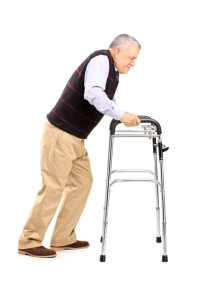Dementia with Huntington’s disease develops relatively early in life as it is a genetic abnormality. It starts at an age of 35 to 50 years and dementia develops along with it.
It affects muscle movement, gait and psyche. The genetic abnormality on chromosome 4 codes for an abnormal protein that is stored in nerve cells of certain parts of the brain. In the beginning this process starts insidiously.
Later into the disease patients lose their physical capabilities and mental capacity more and more. Walking becomes impossible, swallowing can be difficult to the point where a gastric feeding tube has to be considered. The mental functioning deteriorates rapidly into a progressive dementia. Before the dementia develops fully with Alzheimer’s type symptoms, there can be a confusing array of symptoms of mental disorders ranging from apathy to a type of schizophrenia and bipolar disease.
Even behavior problems can be one of the first symptoms before other symptoms of Huntington’s disease develop. Eventually chorea and dementia will set in as the normal function of the nervous system is interrupted by the pathological protein.
Treatment
Treatment of this condition requires a neurologist. A combination of antipsychotic medications and newer still experimental medications can be utilized to help with some of the symptoms of the disease, but ultimately genetic therapy to turn off the pathological protein production may be the answer. Although this is not available at this point, remarkable research has been done in this area, in a mouse model (thanks to www.sciencedaily.com for this link) first, but similar clinical trials are on their way.
References:
1. OL Lopez et al. Neurology 2000 Dec 55(12):1863-1869.
2. K Yasojima et al. Brain Res 2000 DEC 887(1):80-89.
3. A Kontush et al. FreeRadicBiol Med2001Jan30(1): 119-128.
4. H Vanderstichele et al. Amyloid 2000Dec7(4):245-258.
5. Neely et al. Lipids 2000 Nov35(11):1249-1257.
6. RA Yokel Neurotoxicology 2000 Oct21(5):813-828.
7. Petanceska et al. Exp Gerontol 2000 Dec 35 (9-10):1317-1325.
8. MB Liddell et al. Brit J Psychiatry 2001 Jan 178: 7-11.
9. Sramek et al.ExpertOpinInvestigDrugs2000Apr9(4):899-915.
10.K Kosaka et al. Neuropathology 2000 March 20(1): 1-7.
11.V Haroutunian et al.Arch Neurol 2000 Aug57(8):1145-1150.
12. C Puckett et al. Am J Hum Genet 1991Aug49(2):320-329.
13. M Haltia Ann Med 2000 Oct 32(7): 439-500.
14. Ferri: Ferri’s Clinical Advisor: Instant Diagnosis and Treatment, 2004 ed., Copyright © 2004 Mosby, Inc.
15. Rakel: Conn’s Current Therapy 2004, 56th ed., Copyright © 2004 Elsevier







